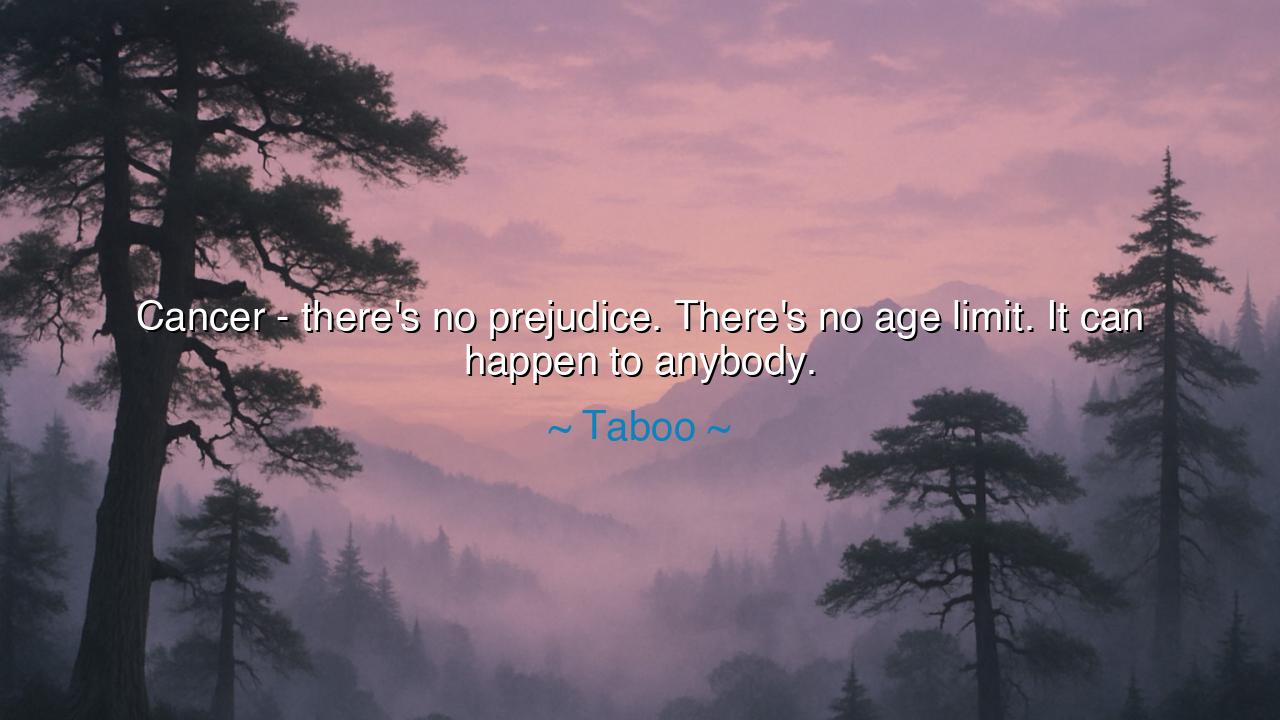
Cancer - there's no prejudice. There's no age limit. It can






“Cancer — there’s no prejudice. There’s no age limit. It can happen to anybody.” — Taboo
Thus spoke Taboo, the artist and warrior of spirit, a man who stared into the face of mortality and emerged with a deeper song in his heart. In this solemn truth, he reveals one of the most humbling lessons of existence: that suffering knows no boundaries, and disease bows to no station, no color, no creed. His words are not merely about cancer, but about the fragility of life itself — that all are equal beneath the shadow of affliction. Through pain, we are stripped of illusion; through vulnerability, we are made brothers and sisters once more.
In the ancient days, men built walls between one another — of class, of tribe, of power — believing that fate could be held at bay by wealth or wisdom. Yet sickness has always been the great equalizer. The pharaoh in his palace, the farmer in his field, the child at her mother’s side — all are subject to the same mysterious hand. Taboo, who himself battled cancer and survived, spoke from this place of awakening. He had learned that illness is not the mark of weakness, but the teacher of humility; not the end of strength, but the birth of compassion.
His words recall the story of Lance Armstrong, the cyclist who, at the height of his prowess, was struck by cancer. The world saw him as indestructible — an athlete made of endurance itself — until the disease reminded him that the flesh of champions and the flesh of beggars are made of the same dust. Armstrong’s struggle, whatever controversies followed, taught millions that cancer does not discriminate. Its reach ignores trophies, titles, or beauty. And yet, from his suffering came a movement — a collective fight that lit the fires of awareness and courage in countless others.
Throughout history, illness has been both destroyer and revealer. When the great playwright Anton Chekhov, himself a doctor, succumbed slowly to tuberculosis, he wrote that sickness teaches us what truly matters — that beneath our worldly pursuits, we are all fragile spirits clinging to love, meaning, and memory. So too does Taboo’s reflection echo this eternal wisdom. To say that cancer “can happen to anybody” is not to invoke despair, but to awaken empathy. It is to remind us that no one walks immune beneath the sun, and that our shared mortality should unite rather than divide us.
In the face of such truths, the heart must learn a new kind of strength. For when life reveals its uncertainty, one must answer not with fear, but with awareness — an awareness that every breath, every sunrise, every shared smile is a victory over the unknown. Those who have faced illness and endured emerge as witnesses — living testaments to the resilience of the human soul. They remind us that while pain may come for all, courage also dwells in all. It waits, like a dormant flame, to be called forth when darkness descends.
Taboo’s message is thus not one of surrender, but of awakening. In saying there is “no prejudice” in cancer, he urges us to cast away our own — to cease judging one another by circumstance or difference, and instead see the sacred sameness that suffering reveals. For in that recognition lies our salvation: the power to comfort, to support, to heal not only the body, but the collective spirit of humanity. The illness that touches one touches all; the courage that rises in one can inspire the many.
Practical counsel for the living:
-
Cherish your health, but do not take it for granted; treat each day as the gift it is.
-
Support those in struggle, not with pity, but with solidarity and respect.
-
Speak openly of illness, for silence breeds fear, and fear isolates the wounded.
-
Remember always: the body may falter, but the spirit, when nourished by love and courage, is indestructible.
For as Taboo reminds us, mortality is the one truth that binds all humankind. Cancer, in its cruelty, reminds us of our equality — and in that equality lies a hidden grace. It teaches that to live is not to deny death, but to defy despair. Those who face it, who love in spite of it, who rise after it — these are the immortals of the heart. Through them, the world learns that even when life is threatened, the human spirit still sings.






AAdministratorAdministrator
Welcome, honored guests. Please leave a comment, we will respond soon